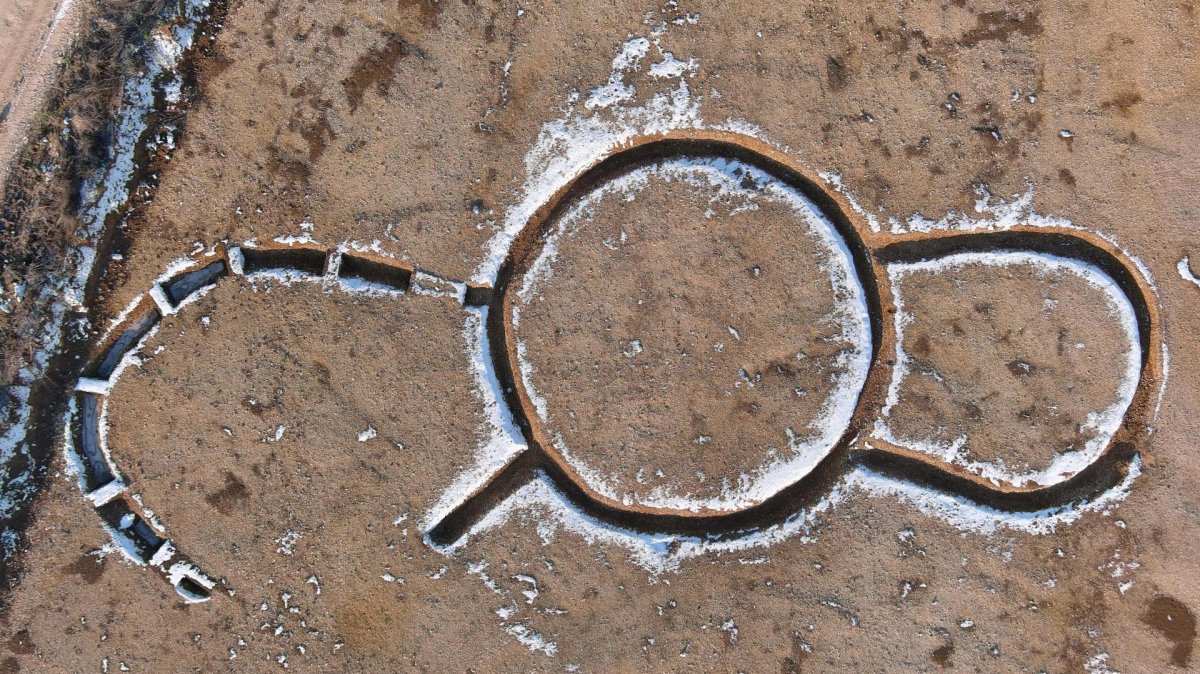Archaeologists have uncovered a mysterious prehistoric monument in what has been described as an "unprecedented" discovery.
The ancient structure emerged during excavations carried out by the French National Institute of Preventive Archaeological Research (INRAP) in the commune of Marliens, eastern France, which lies about nine miles southeast of the city of Dijon.
Excavations at the site have revealed a series of human occupations spanning thousands of years from the Neolithic period (or New Stone Age) to the Iron Age. The oldest evidence of occupation at the site consists of an enigmatic monument featuring three interconnected enclosures, INRAP said in a press release.
In the center of the monument is a circular enclosure measuring around 36 feet in diameter. To the north, a 26-foot-long "horseshoe"-shaped enclosure extends outwards from the central circle. To the south, an almost square-shaped enclosure with rounded corners juts out from the other side.

According to INRAP, the available evidence suggests that all three enclosures are contemporary. However, many unknowns remain regarding the structure's nature and purpose, not to mention its age.
"This type of monument seems unprecedented and currently no comparison has been possible," INRAP said in the press release.
The age of the structure remains unclear but the only artifacts found in association with it, consisting of flint objects, suggest that it dates to the Neolithic archaeological period, which in France began in what is now the south of the country during the 6th millennium B.C.
Radiocarbon dating efforts are currently underway in order to determine the age of the structure with more precision.
Aside from the enigmatic monument, archaeologists have also made a number of other finds at the site.
These include several objects that have been attributed to the Bell Beaker phenomenon—an archaeological culture that appeared around 4,500 years ago in Europe.
The excavations also uncovered evidence of occupation at the site from the Early Bronze Age, which in France is generally thought to have lasted from around 2300-1650 B.C. These Bronze Age remains include several wells, which contain clay layers at the bottom that may yield information about the area's natural environment in the first half of the second millennium B.C., according to INRAP.
In addition, archaeologists unearthed a necropolis consisting of five circular enclosures, featuring the remains of burials and a funeral pyre. This burial site is thought to date to the period 1500-1300 B.C. during France's Middle-Late Bronze Age. The necropolis yielded several artifacts, including copper alloy pins, rare ceramic shards and a necklace of around forty amber beads.
The final stage of occupation uncovered at the site corresponds to a second necropolis located more than 1,300 feet away from the aforementioned one. This necropolis contains cremated remains held in urns from the Iron Age, as well as some ornaments, such as bracelets and rings. In France, the Iron Age extends from around 800 B.C. to the end of the 1st century.
Do you have a tip on a science story that Newsweek should be covering? Do you have a question about archaeology? Let us know via science@newsweek.com.
Uncommon Knowledge
Newsweek is committed to challenging conventional wisdom and finding connections in the search for common ground.
Newsweek is committed to challenging conventional wisdom and finding connections in the search for common ground.
About the writer
Aristos is a Newsweek science reporter with the London, U.K., bureau. He reports on science and health topics, including; animal, ... Read more
To read how Newsweek uses AI as a newsroom tool, Click here.








